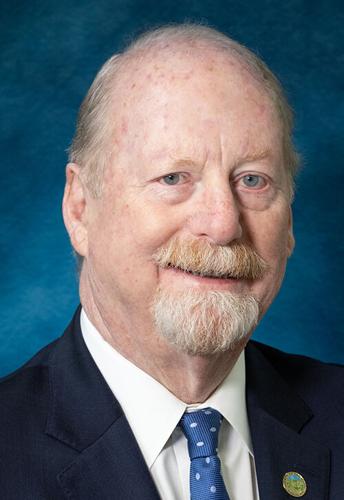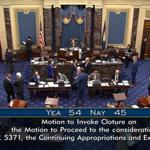As he rolled out his 2025 state budget, Gov. Gavin Newsom promised “balanced solutions” to close a looming deficit.
His solution for San Mateo County could hardly be more bleak.
It’s one in which all 20 cities and the county — the local government that provides health and mental health services, nutrition programs for newborns, and specialized services for elderly and disabled residents — will see budgets slashed by a total of $70 million next year, with more cuts on the way.
Worst of all, the governor’s budget proposal singles out San Mateo County and its 750,000 residents.
No other urban county in California, and only two others out of the state’s 58 counties (Alpine, population 1,200, and Mono, population 13,000), are targeted.
That’s not balance. That’s a travesty.
Driving this injustice is a loophole in a statute known as the Vehicle License Fee Swap (or just VLF for short). That law sought to plug holes in the 2004 state budget by creating a complicated revenue-shifting scheme by which counties and cities annually receive an additional share of local property taxes to replace a portion of the vehicle license fee revenue that local entities were owed by the state before 2004.
These revenues are operating dollars for core services that all counties and cities depend on. While 55 of the 58 counties have received their revenue through this mechanism without any hiccup for decades, the statute failed specifically to account for certain local property tax dynamics that have recently arisen in just three counties, leaving a state obligation without an adequate payment mechanism.
Since this statutory ambiguity was identified several years ago, the state has plugged that gap with a specific reimbursement for those counties and cities that would otherwise suffer cuts through no fault of their own. However, this year, the administration has refused to make good on that promise, instead opting to exploit this loophole to help the state solve its latest budget crisis.
In other words, the state’s fix comes on the back of San Mateo County residents.
What’s at stake?
In the city of San Mateo, 10% of the city’s general fund operating revenue is threatened. This revenue is a key funding source for essential city services such as police and fire protection, transportation, housing, libraries, parks and recreation, and other critical services.
Recommended for you
In Pacifica, public safety, public health and housing, recreation programs, engineering services — all core city services — is at risk. The missing revenue accounts for 11.5% of general operating funding, and without this lifeblood the city faces reduced capacity for understaffed departments and the ability to attract and retain employees.
And at County Center in Redwood City, funds for affordable housing for vulnerable seniors and families, programs to address the homelessness crisis, wildfire prevention and children’s summer learning programs among others are being considered for rollbacks if this vital source of local funding is cut. Roughly 18% of the county’s general fund operating budget is threatened.
The story is similar at city halls across San Mateo County.
There is really only one way out of this predicament.
The county and cities have worked closely with our state legislative delegation to request their support to ensure the reimbursement was added to the state budget. Their diligent efforts paid off last week when it was announced the reimbursement was included in the Legislature’s joint budget plan. Once that bill is approved by both houses, the ball moves to the governor’s court to approve the reimbursement without any revision.
We urge residents to call or send an email to the governor’s office to support including San Mateo County’s $70 million VLF shortfall reimbursement in the state budget.
From the outside looking in, San Mateo County seems flush with public budgets fueled by high residential and commercial property taxes and lots of high-tech jobs centered between San Francisco and San Jose.
However, a closer look reveals an area with a burdensome cost of living where preschool is unaffordable, rents are sky high and people on a fixed income may be a check away from losing a roof over their heads.
Let’s not make it tougher on local residents by putting essential services at risk. We call on the governor simply to maintain what’s been done for the past 20 years.
We call on the governor to do right by San Mateo County.
Take action: Contact the governor’s office via email at Leg.Unit@gov.ca.gov.
Warren Slocum is president of the San Mateo County Board of Supervisors. Lisa Diaz Nash is the mayor of the city of San Mateo. Sue Vaterlaus is the mayor of the city of Pacifica.






























(1) comment
So San Mateo cities need to cut 10% from budgets. Here's the first cut i'd make: the hundreds of thousands spent on consultants to prepare the pretty but largely ignored "plans" the state requires for housing, transit, equity, and on and on.
Welcome to the discussion.
Log In
Keep the discussion civilized. Absolutely NO personal attacks or insults directed toward writers, nor others who make comments.
Keep it clean. Please avoid obscene, vulgar, lewd, racist or sexually-oriented language.
Don't threaten. Threats of harming another person will not be tolerated.
Be truthful. Don't knowingly lie about anyone or anything.
Be proactive. Use the 'Report' link on each comment to let us know of abusive posts.
PLEASE TURN OFF YOUR CAPS LOCK.
Anyone violating these rules will be issued a warning. After the warning, comment privileges can be revoked.